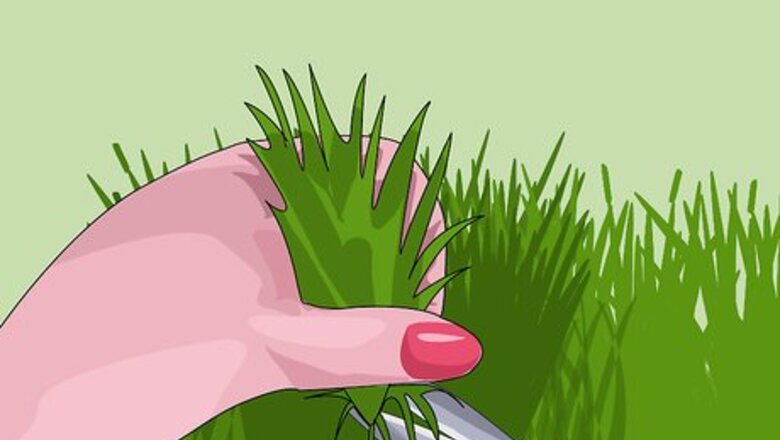
views
X
Research source
Many health food stores carry pre-made wheatgrass juice, but you can also make your own without much difficulty -- or without shelling out too much money. Grinding the wheatgrass into juice using a mortar and pestle produces the most nutritious results[2]
X
Research source
. You can also use a blender to make wheatgrass juice, or use a juicer. [3]
X
Research source
Preparing the Wheatgrass
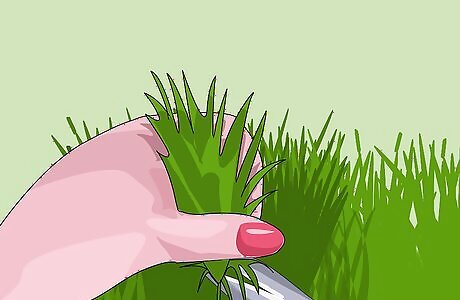
Harvest wheatgrass by snipping the blades about one 1 in. (2,5cm.) above the ground. Use a clean knife or pair of scissors. The blades should be about 8 inches (20 1/3 cm.) tall, having grown for about a week after the wheat grains were sown. If you're not growing your own wheatgrass, you can purchase it in a health food store or some grocery stores.
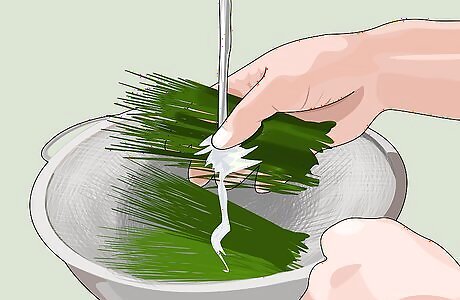
Wash the blades under clean, running water. Place the wheatgrass blades inside a strainer and run cool to lukewarm tap water over the grass and through the strainer to remove any dirt, insects, or bacteria.
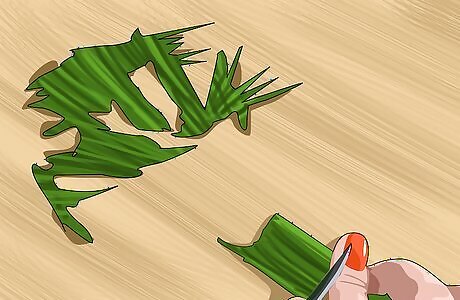
Chop the wheatgrass using a sharp knife. Place the wheatgrass on a cutting board and give the blades a rough chop. The smaller the pieces are, the easier it will be to grind or blend them and create the juice.
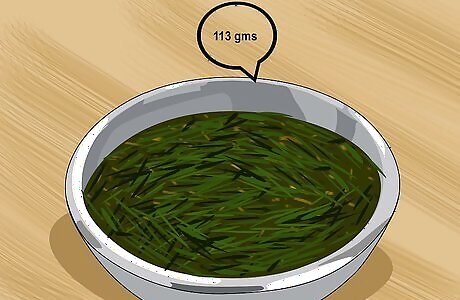
Collect enough chopped wheatgrass to fill at least 1/2 cup (113 grams). You can work in smaller or larger batches, if desired, but this amount should be enough for about two servings. This will be enough to give you a healthy dose of all of the wonderful properties that wheatgrass has in store for you.
Using a Juicer
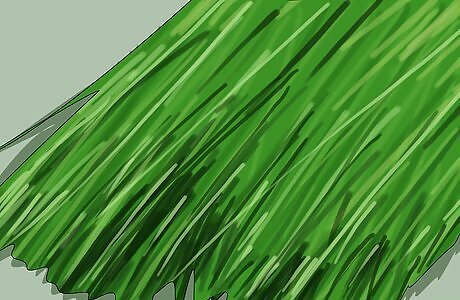
Prepare your wheatgrass. Prepare as much chopped wheatgrass as you want to use. You'll need to feed it into your juicer.
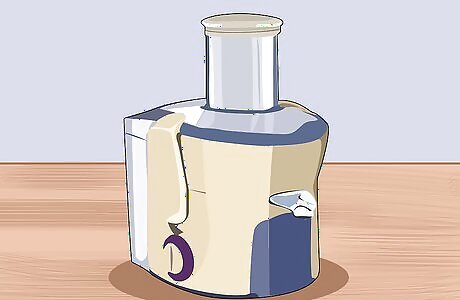
Prepare your juicer. Every juicer is different, so you'll have to set it up according to the instructions in your manual. Manual wheatgrass juicers can look a bit like meat grinders, and tend to include a handle that you grind, along with a pestle-type implement to push the grass down. Manual wheatgrass juicers can sometimes only be really used for wheatgrass, so if you splurge on a juicer, you may want to get an electric juicer so you can use it for juicing other vegetables as well. Electric juicers blend the grass more easily, but they require a bit more cleanup. If you get an electric juicer, make sure you get a masticating one. A centrifugal juicer will not juice wheatgrass at all.
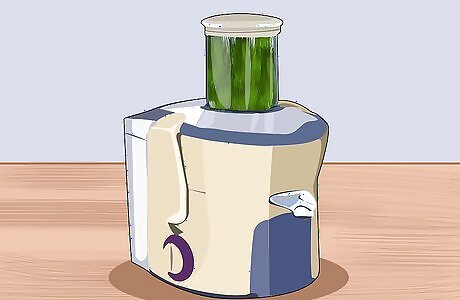
Feed the wheatgrass into the juicer. Now, just feed the wheatgrass into the juicer. For most juicers, you'll have to fill them a little bit at a time, so you don't cram the juicer and make it difficult to juice the wheatgrass. The juicer will then have a place for the juice to be collected, as well as a place for the pulp to go.
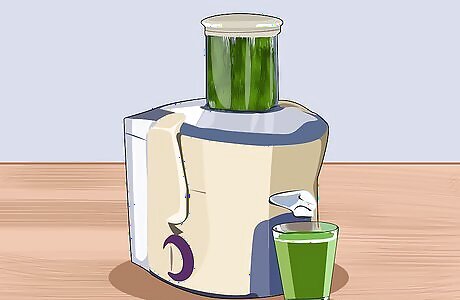
Pour the juice from the juicer into a glass and enjoy. You should be all done juicing your wheatgrass. Though a juicer for wheatgrass or a juicer in general can get a bit pricy, if you're really committed to juicing wheatgrass regularly, it can make a real difference in your life. After you pour it into a glass and enjoy a portion of delicious wheatgrass juice, all you have to do is clean up your juicer and you're all done.
Using a Blender
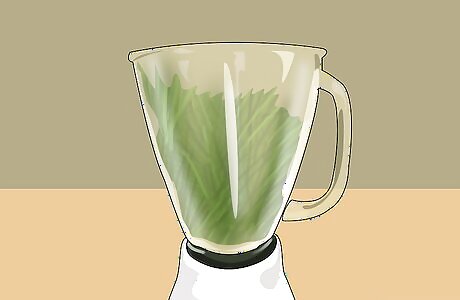
Put 1/2 cup (113 grams) of chopped wheatgrass into a blender with 2 to 3 cups (500 to 750 milliliters) of filtered water. If you prefer a stronger, more concentrated taste, stick with only 2 cups (500 milliliters) of filtered water. If you are unaccustomed to the taste of wheatgrass, however, or if you find it overpowering, dilute the juice more by using 3 cups (750 milliliters) of water instead. If you like, you can substitute the water with fresh-squeezed orange juice or coconut juice instead. This can give the wheatgrass shot you'll be preparing a bit more flavor.
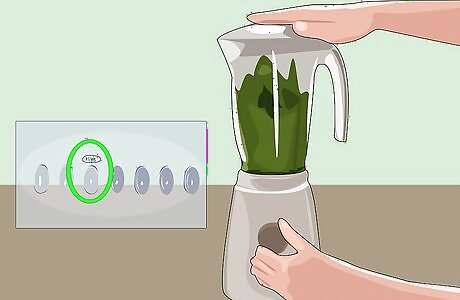
Blend the wheatgrass and water together using the highest speed. Blending for about 60 seconds should suffice. You should be left with an emerald green juice with chunks of pulp floating at the surface. Note that the grass may get tangled around the blades of the blender if the blades of grass are too long. This will not be an issue in most cases, and you can simply clean the blades of your blender after you finish getting the juice out. Pay attention to possible signs of trouble, though, like a slowing blade or the sounds of a struggling motor. If you suspect that the wheatgrass is clogging your blender, you may need to fish out the wayward wheatgrass before you continue blending.
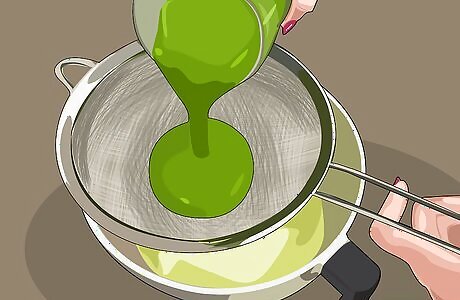
Place a mesh strainer over a clean glass bowl. The strainer should have fine gaps, and it should be no larger than the mouth of the bowl you place it over.
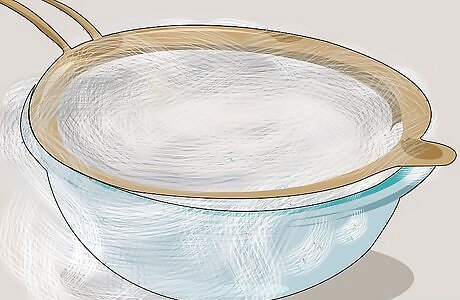
Line the strainer with cheesecloth. The cheesecloth should be large enough to hang over the sides of your strainer.
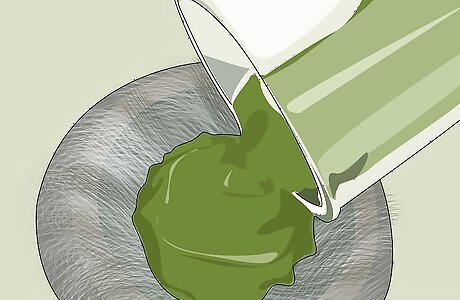
Pour the wheatgrass from your blender through the cheesecloth and strainer. Most of the liquid should flow through without much effort on your part.
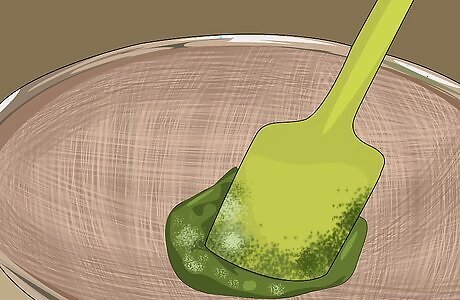
Using a rubber spatula, press down on the wheatgrass pulp to squeeze out additional juice. This juice should also flow through the cheesecloth and into the container. Continue pressing down on the wheatgrass until no more juice comes out.
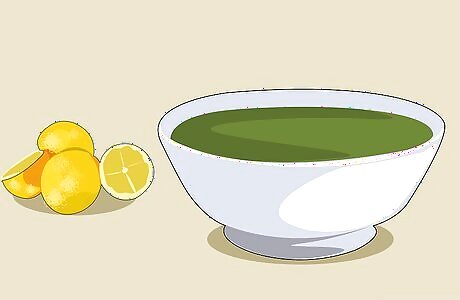
Squeeze juice from a lemon half into the bowl of wheatgrass juice. The lemon is only optional, but it enhances the flavor of the wheatgrass while preserving the juice a little longer. Mix with a spatula or spoon to combine. This can be especially useful if you stick to water instead of using juice for your blended mix.
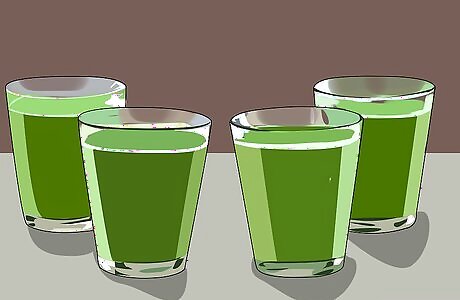
Transfer the wheatgrass from the container into glasses to enjoy. Serve it chilled or with ice. Wheatgrass can be best enjoyed in shot form.
Using a Mortar and Pestle
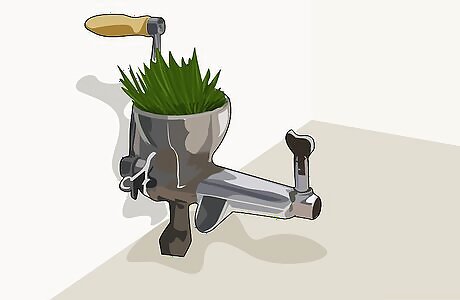
Place enough chopped wheatgrass into the mortar to fill the bottom. Do not fill the mortar more than 1/4 full. If it's too full, then you won't be able to fully grind it.
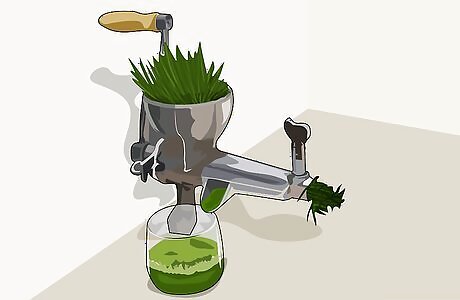
Grind the blades. Use the pestle to thoroughly grind the blades until they begin to stick together and smear along the bottom of the mortar. Apply the pestle using a stirring motion, and press with enough force to crush the grass. This will take a few minutes, and more than a bit of effort, so be prepared.
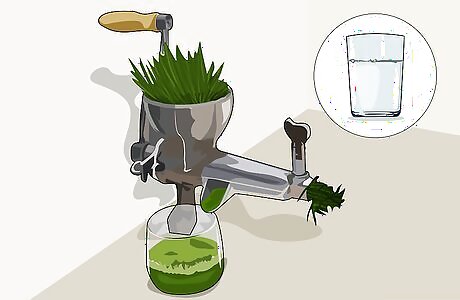
Add a little water. Equal parts water should be sufficient for this method. Mash the water into the crushed wheatgrass using the same forceful stirring motion as described above. Continue mixing until a fine paste forms. The water will help you sufficiently grind down the blades of grass.
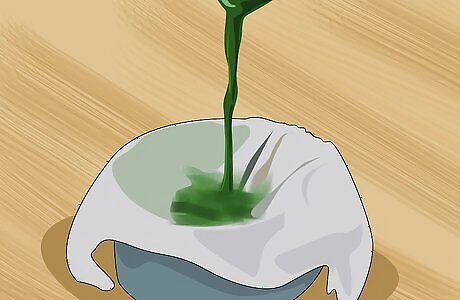
Empty the contents of the mortar into a clean muslin cloth. Twist the top of the cloth to prevent the paste from escaping, but do not tie it. This will allow you to extract the juice from the wheatgrass.
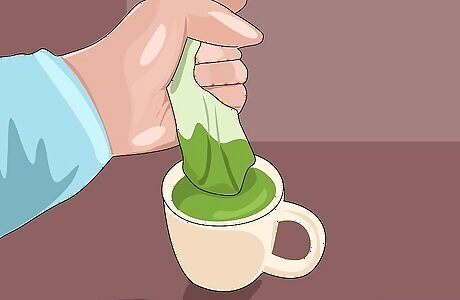
Press on the cloth to drain the wheatgrass juice out into a clean glass. Apply pressure to the cloth directly above the clump of wheatgrass paste, squeezing in a downward motion. A bright green liquid should drip out. Continue squeezing until no further liquid drains.
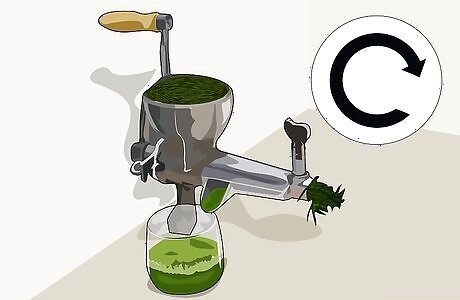
Return the wheatgrass clump to the mortar. Repeat the grinding process until the blades turn white, adding a little extra water each time to create a paste of the same consistency.
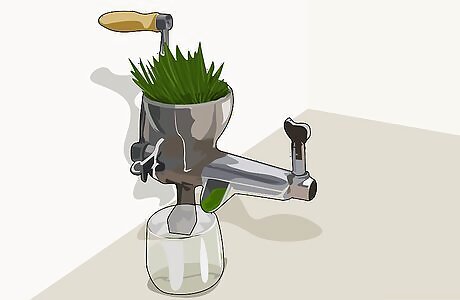
After your initial batch of wheatgrass turns white, add fresh chopped wheatgrass to the mortar and begin the grinding process again. Continue until your full 1/2 cup (113 grams) has been used. This process does take a while, (at least 10-15 minutes for 1/2 a cup), but it'll be worth it. It's much better than paying $300-$400 for a fancy wheatgrass juicer.




















Comments
0 comment